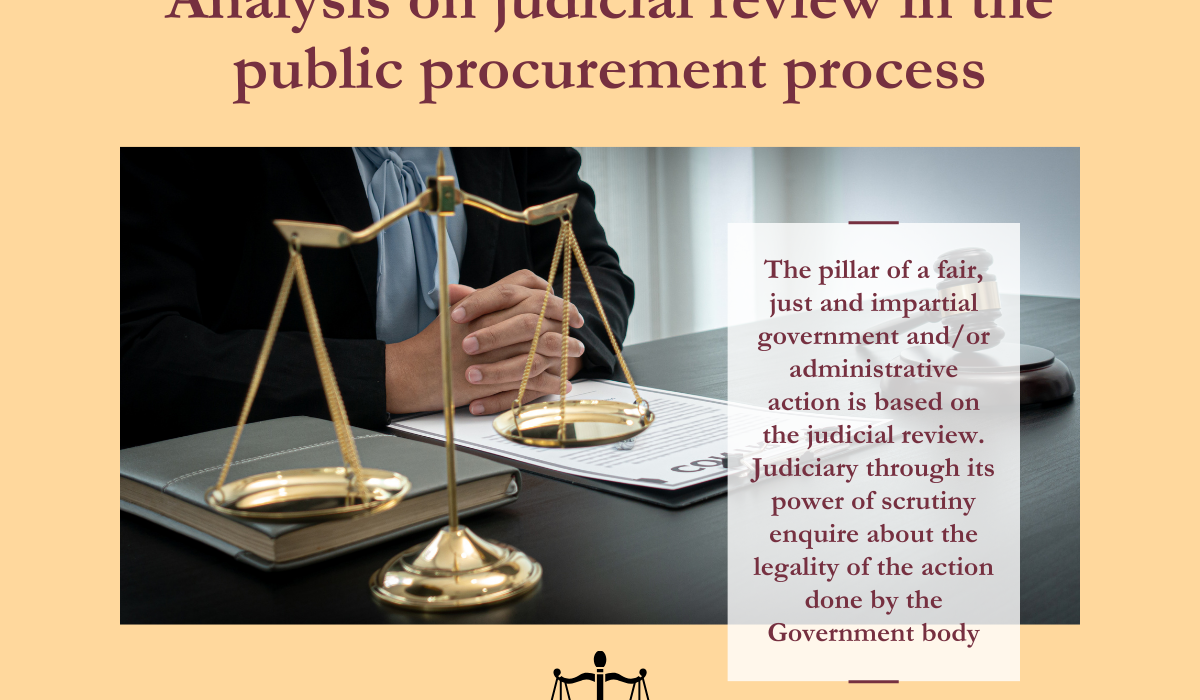Analysis on judicial review in the public procurement process
JUDICIAL REVIEW OF PUBLIC PROCUREMENT PROCESS
INTRODUCTION
The pillar of a fair, just and impartial government and/or administrative action is based on the judicial review. Judiciary through its power of scrutiny enquire about the legality of the action done by the Government body which included creating checks and balances qua the decision taken by any public authority and to determine whether such actions are consistent with the constitution. However, the question arises that to what extent the court can judicially review the tendering process conducted by the Government authorities has been a matter of careful consideration.
The rule of law governs the government authorities. As a result, these authorities have a constitutional duty to uphold absolute justice and openness throughout the tender process and when making decisions to grant government contracts to successful bidders or tenderers after taking into account all bidders or tenderers submissions. The judicial review and monitoring ensures that public authorities do not operate in a unilateral or discriminatory manner. For this reason, the Hon’ble Supreme Court has continuously directed through several judgments that the unsuccessful bidders or tenderers may contest their exclusion by the public authorities through writ petitions under Article 226, the manner, method, and motivation with which the public authorities undertake the said administrative actions and decisions may be tested upon the certain grounds which were laid down by the catena of judgments by the Hon’ble Supreme Court.
DIRECTIONS GIVEN THROUGHOUT YEARS BY THE HON’BLE SUPREME COURT
In the matter of Star Enterprises vs City and Industrial Development Corpn. of Maharashtra Ltd. (1990) 3 SCC 280, 284, the Hon’ble Supreme Court emphasized the need for judicial scrutiny of the administrative activities and judgments as a means of checks and balances. The public exchequer has a large stake in larger social audits, judicial control, and public review because the State has entered the commercial sector and larger public sector undertakings have grown. These requirements necessitate recording of the reasons for executive actions and seeking justification for such action when the decision has been taken by biasness. The relevant paragraph of the case is reproduced herein below:
“10. As the State has descended into the commercial field and giant public sector undertakings have grown up, the stake of the public exchequer is also large justifying larger social audit, judicial control and review by opening of the public gaze; these necessitate recording of reasons for executive actions including cases of rejection of highest offers.… Looking for reasons in support of such action provides an opportunity for objective review in appropriate cases both by the administrative superior and by the judicial process.”
In the other case of Ram and Shyam Company v. State of Haryana and Ors (1985) 3 SCC 267, the Hon’ble Supreme Court reiterated and reproduced herein as:
“The law is well-settled that contracts by the State, its corporations, instrumentalities and agencies must be normally granted through public auction/public tender by inviting tenders from eligible persons and the notification of the public-auction or inviting tenders should be advertised in well-known dailies having wide circulation in the locality with all relevant details such as date, time and place of auction, subject-matter of auction, technical specifications, estimated cost, earnest money Deposit, etc. The award of Government contracts through public-auction/public tender is to ensure transparency in the public procurement, to maximize economy and efficiency in Government procurement, to promote healthy competition among the tenderers, to provide for fair and equitable treatment of all tenderers, and to eliminate irregularities, interference and corrupt practices by the authorities concerned. This is required by Article 14 of the Constitution. However, in rare and exceptional cases, for instance during natural calamities and emergencies declared by the Government; where the procurement is possible from a single source only; where the supplier or contractor has exclusive rights in respect of the goods or services and no reasonable alternative or substitute exists; where the auction was held on several dates but there were no bidders or the bids offered were too low, etc., this normal rule may be departed from and such contracts may be awarded through ‘private negotiations'”.
Furthermore, the Hon’ble Supreme Court had provided several directions with regards to the discretionary power of the Tendering Authority while allowing or canceling the proposed bid of the participants. The public authorities are free to set their own terms and conditions in the Request of Proposal (RFP)/ tender proposal floated and may even negotiate before choosing to accept an offer that has been proposed to them. If the tender terms allow it, they are also allowed to offer any relaxation for legitimate reasons. However, in order to ensure fairness of the procurement procedure by the public authorities in India, the Hon’ble Supreme Court of India in the matter of B.S.N. Joshi & Sons Ltd. v. Nair Coal Services Ltd.(2006) 11 SCC 548, laid down certain checks and balances which are reproduced as under:
- “If there are essential conditions, the same must be adhered to.
- If there is no power of general relaxation, ordinarily the same shall not be exercised and the principle of strict compliance would be applied where it is possible for all the parties to comply with all such conditions fully.
- If, however, a deviation is made in relation to all the parties in regard to any of such conditions, ordinarily again a power of relaxation may be held to be existing.
- The parties who have taken the benefit of such relaxation should not ordinarily be allowed to take a different stand in relation to compliance of another part of tender contract, particularly when he was also not in a position to comply with all the conditions of tender fully, unless the court otherwise finds relaxation of a condition which being essential in nature could not be relaxed and thus the same was wholly illegal and without jurisdiction.
- When a decision is taken by the appropriate authority upon due consideration of the tender document submitted by all the tenderers on their own merits and if it is ultimately found that successful bidders had in fact substantially complied with the purport and object for which essential conditions were laid down, the same may not ordinarily be interfered with.
- The contractors cannot form a cartel. If despite the same, their bids are considered and they are given an offer to match with the rates quoted by the lowest tenderer, public interest would be given priority.
- Where a decision has been taken purely on public interest, the Court ordinarily should exercise judicial restraint.”
As a consequence thereof, there has been a huge rise in the writ proceedings under Article 226 of the Constitution of India for the judicial review of the tender process and it appeared that almost every tender, whether small or big, was being sought to be challenged by way of writ petitions in a routinely manner. Be that as it may, the Hon’ble Supreme Court held that, in the tender matters, judicial review is equivalent to judicial restraint. What is reviewed is not the decision itself but the manner in which it was made. The writ court does not have the expertise to correct such decisions by substituting its own decision for the decision of the authority. The Hon’ble Supreme Court then observed certain guidelines under the case of Tata Cellular v. Union of India (1994) 6 SCC 651, the relevant paragraph is reproduced herein for further clarity:
“94. The principles deducible from the above are:
- The modern trend points to judicial restraint in administrative action.
- The court does not sit as a court of appeal but merely reviews the manner in which the decision was made.
- The court does not have the expertise to correct the administrative decision. If a review of the administrative decision is permitted it will be substituting its own decision, without the necessary expertise which itself may be fallible.
- The terms of the invitation to tender cannot be open to judicial scrutiny because the invitation to tender is in the realm of contract. Normally speaking, the decision to accept the tender or award the contract is reached by process of negotiations through several tiers. More often than not, such decisions are made qualitatively by experts.
- The Government must have freedom of contract. In other words, a fair play in the joints is a necessary concomitant for an administrative body functioning in an administrative sphere or quasi-administrative sphere. However, the decision must not only be tested by the application of Wednesbury principle of reasonableness (including its other facts pointed out above) but must be free from arbitrariness not affected by bias or actuated by mala fides.
- Quashing decisions may impose a heavy administrative burden on the administration and lead to increased and unbudgeted expenditure.”
If the qualified bidder of the tender process substantially complies with the essential terms and conditions of the tender document issued by such tendering authority, the public authorities may choose to grant government contracts to the said participant. Nevertheless, the power possessed to the tendering authority is not unfettered and unchecked and it shall be used by the government authorities under the boundaries of Article 14 of the Constitution. Article 226 of the Constitution grants the High Courts jurisdiction with respect to challenging the discriminatory tender process, which is intended to provide more responsibility, legitimacy, and transparency on the side of these authorities. It is pertinent to say that the restriction of the High Court jurisdiction to intervene under Article 14 of the Constitution is restricted to very specific circumstances, namely where the public authority’s decision or administrative action in question is arbitrary, biased, illogical, dishonest, or unreasonable. Errors in evaluation or irregularities in procedure, which might take precedence over the public interest, are not justifications for such intervention. Furthermore, the High Courts should not undertake a technical review of the tender document and it is the sole responsibility of the tender document creator i.e., the tendering authority.
CONCLUSION
As there has been a rise in Writ Petition challenging mostly every tender decision by the public authority, the Hon’ble Supreme Court had directed that the Hon’ble High Courts should not interfere with the said administrative actions and decisions of public authorities. Therefore, the Hon’ble Supreme Court has consistently held that the contracts made between private parties should not be subject to court scrutiny through the use of writ jurisdiction, and that judicial involvement in decisions made by public bodies on the award of contracts should be restricted. Nonetheless, the courts do allow for intervention over the method used to arrive at a judgment, action, or procedure given the involvement of public authorities. The challenge to the tender process would require to show that the public authority’s decision, action, or process was arbitrary, irrational, mala fide, whimsical, or illegal. That it was made in favour of someone else and was made with an ulterior motive. The successful challenge to the tender is needed to prove if there is an abuse of power by the tendering authority and how the said decision had negatively impacted the public interest. The Petitioner may also provide evidence that the condition for which non-compliance is being claimed to have occurred was either necessary or not.
Authored by: Anukriti, Legal Associate, SUO Law Offices.



